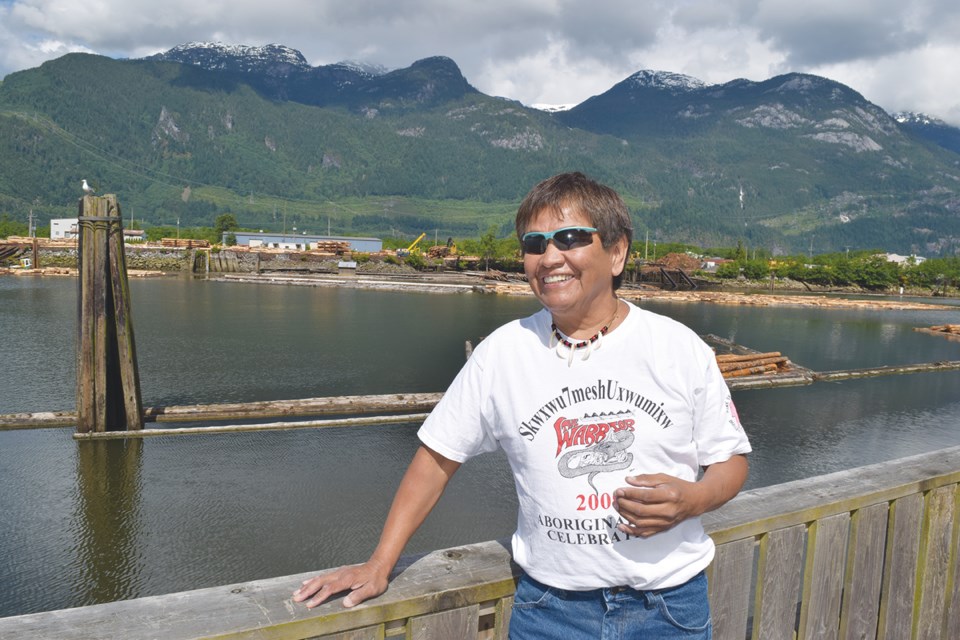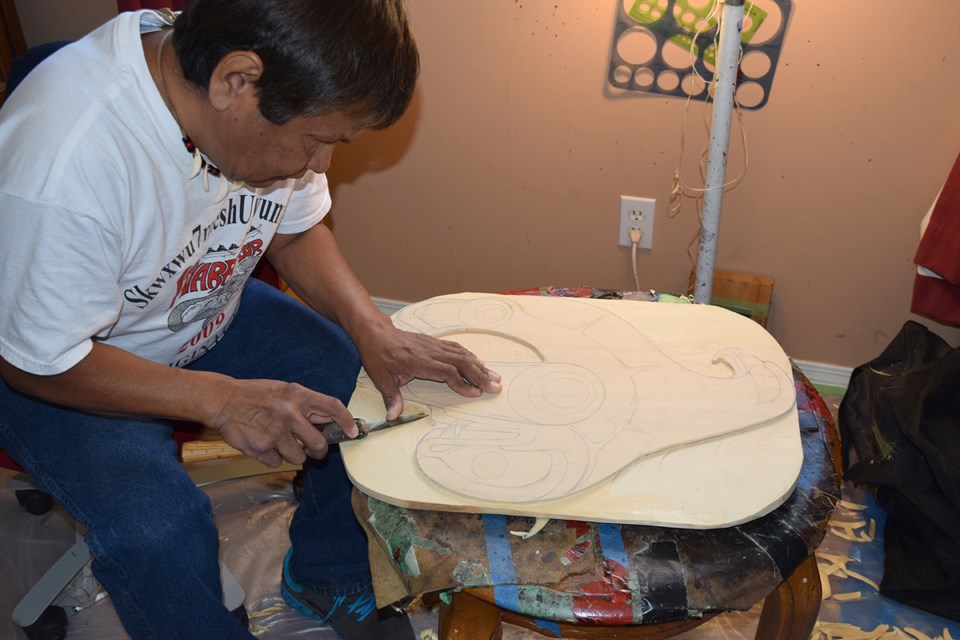Artist and educator Art Harry sits stooped over a slab of yellow cedar, his hand working the blade of his carving knife with precision, following the pencil lines of the eagle’s wing. ��
Harry, a �鶹�����Nation member who learned how to carve from renowned elders such as the late Chief Larry Joseph, works surrounded by pieces of his art and photos of his four daughters and nine grandchildren. A few portraits of a young Elvis Presley watch over him as well, but those he says with a chuckle, belong to his wife.��
The �鶹����� caught up with Harry, 58, for a chat and a walk that led from Totem Hall to his home and workshop to the Stawamus Waterfront.��
What follows is an edited version of that conversation.��
��
Q: You work on large pieces like totems and pieces that cover entire walls, as well as on smaller pieces you can hold. Which do you prefer?��
A: I like to do both. Whenever I get the opportunity to do bigger pieces I do. I am slowly working on my own house post. It represents my wife’s bear clan on the bottom and the wolf clan on the top. I put the wolf, my clan, on top because the bear is stronger and can hold the wolf clan up. My four daughters (aged between 21 and 37) are represented on it too.��
Q: How did you learn your craft?��
A: I started drawing in elementary school. Then, in the late 1970s or early 1980s, the late Chief Larry Joseph had night classes at the old Totem Hall.��
As soon as I could see what he did with a piece of wood, it took a piece of my heart. I thought, I’ve got to learn how to do that. That turned out to be my present and future.��
Q: How does it feel to teach your art at schools?��
A: All of our ways are taught by word of mouth. The ways aren’t taught in books. That is why I believe with the bridges we are building in the community, hopefully everyone understands you don’t have to go to school for a diploma to teach this. Teaching makes me feel lighter. It is so special to me.
Q: What have you learned about women raising four daughters?��
A: Not to mouth back! When I first met my wife, Theresa, she had nine sisters and if I argued with her, I was arguing with all of them. Now I know when to keep my mouth shut.��
Q: You have nine grandchildren now. How does that feel?��
A: Awesome. It makes me feel younger, especially my oldest grandson who just turned nine years old. He says he wants to learn carving.
Q: What was it like in �鶹�����when you were growing up?
A: I was born and raised here. We lived just up the road from Totem Hall. I used to walk to school at Stawamus, listening to the birds and wildlife. It was really awesome. I knew a lot of friends, and met more friends and relatives in high school. We walked everywhere. My dad walked to work down by Shannon ��Falls, at Point Grey Towing.��
Q: You were a war canoe athlete as well when you were young, correct?��
A: Yes, I was on an 11-man war canoe in 1976. I kept my regalia. They still have the canoe in Brackendale. The Billy family owns it. Back then the kids had not much to do so they started a canoe club and I joined. I was scared of water – I didn’t know how to swim – but I went out anyway.��
The second time we went out it was real rough and they deliberately tipped the canoe. I just hung on to the canoe while it was upside down. That was to test us to see how long and hard we were going to stay with the team.��
Q: You were on the 1974 championship lacrosse team here as well, I see from the trophy on your shelf. ��
A: Yes, it is one of the pastimes we don’t have any more in town. We had about four or five different divisions. I was bantam and then went to midgets – that is when we got the championship. It wasn’t all native teams, it was a whole community that played at the time. We had a lacrosse box where the [Brennan Park] swimming pool and rec centre is now.��
Q: What do you think of the growth of Squamish?��
A: When we used to go to check the mail everybody knew each other. Now you go there and you hardly know anybody. We are still building bridges in the community so people understand that this is �鶹�����Nation land they are on.��
Q: Some of the new people don’t know that, you think?��
A: Yes. I mean they call the mountain “Mount Garibaldi” after a guy who never came here! We call it Nch’kay.��
Q: You mentioned your father was taken to residential school as a young child. Was it as bad for him as we hear about from other elders? ��
A: Yes it was because whatever they did to him in there he would go drinking to forget and come home and take it out on us kids. He wouldn't talk about what happened to him. He was so frustrated at whatever it was.��
One time I will never forget – he put out matches on the back of our hands. I wonder how hard it was for him to cope with all the bills and that, of a family. He drank as a solution.��
Q: My impression is that you’re such a loving parent, teacher and grandfather. You are so calm. How did you end up that way given all you and your family went through?��
A: My mom. She protected me from my dad. She was so kindhearted and she took care of me. We were a family of six and we took care of each other.��
For the community burnings we do now, I help build the fires and I always pray to my dad about what he went through. We are still here and the punishment that we had isn’t as bad as what he had.��
Q: Maybe this is too personal a question, but if my family went through what you did, I don’t think I could forgive the people who did that – those who took your dad away as a kid. How are you not full of anger? ����
A: The way my parents raised me was not the way I want to raise my kids. I don’t have to go through my anger and take it out on them. When my youngest daughter was two years old I quit drinking.��
At the time I was going to go for one more drink and my wife was walking away home. I took about 10 steps and I turned around and thought, “No, we better stick together.” She was the strength of me.��
Now we are 21 years sober.��




